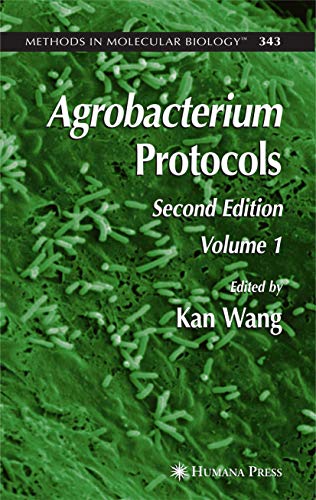Articoli correlati a Agrobacterium Protocols: Volume I: 343

Sinossi
Agrobacterium tumefaciens is a soil bacterium that for more than a century has been known as a pathogen causing the plant crown gall disease. Unlike many other pathogens, Agrobacterium has the ability to deliver DNA to plant cells and permanently alter the plant genome. The discovery of this unique feature 30 years ago has provided plant scientists with a powerful tool to genetically transform plants for both basic research purposes and for agricultural development. Compared to physical transformation methods such as particle bomba- ment or electroporation, Agrobacterium-mediated DNA delivery has a number of advantages. One of the features is its propensity to generate a single or a low copy number of integrated transgenes with defined ends. Integration of a single transgene copy into the plant genome is less likely to trigger gene silencing often associated with multiple gene insertions. When the first edition of Agrobacterium Protocols was published in 1995, only a handful of plants could be routinely transformed using Agrobacterium. Agrobacterium-mediated transformation is now commonly used to introduce DNA into many plant species, including monocotyledon crop species that were previously considered non-hosts for Agrobacterium. Most remarkable are recent developments indicating that Agrobacterium can also be used to deliver DNA to non-plant species including bacteria, fungi, and even mammalian cells.
Le informazioni nella sezione "Riassunto" possono far riferimento a edizioni diverse di questo titolo.
Dalla quarta di copertina
Rapid changes and significant progress have been made in the use of Agrobacterium to genetically transform plants for both basic research purposes and agricultural development. In Agrobacterium Protocols, Second Edition, Volumes 1 and 2, a team of leading experts and veteran researchers describe in detail their best techniques for delivering DNA to plant cells and permanently altering their genomes. Volume 1 details the most updated techniques available for twenty-six plant species drawn from cereal crops, industrial plants, legume plants, and vegetable plants, and presents various methods for introducing DNA into three major model plant species, Arabidopsis thaliana, Medicago truncatula, and Nicotiana. The authors also outline the basic methods in Agrobacterium manipulation and strategies for vector construction, major components of plant transformation that are often neglected by many plant biologists. Volume 2 contains another thirty-three proven techniques for root plants, turf grasses, woody species, tropic plants, nuts and fruits, ornamental plants, and medicinal plants. Additional chapters provide methods for introducing DNA into non-plant species, such as bacteria, fungi, algae, and mammalian cells. The protocols follow the successful Methods in Molecular Biology series format, each offering step-by-step laboratory instructions, an introduction outlining the principles behind the technique, lists of the necessary equipment and reagents, and tips on troubleshooting and avoiding known pitfalls.
Comprehensive and highly practical, Agrobacterium Protocols, Second Edition, Volumes 1 and 2 offers plant biotechnologists a gold standard collection of Agrobacterium-mediated transformation techniques for state-of-the-art plant genetic engineering, functional genomic analysis, and crop improvement, and for inspiration in developing new methods for other related and non-related plants.
Le informazioni nella sezione "Su questo libro" possono far riferimento a edizioni diverse di questo titolo.
EUR 17,08 per la spedizione da U.S.A. a Italia
Destinazione, tempi e costiCompra nuovo
Visualizza questo articoloGRATIS per la spedizione da U.S.A. a Italia
Destinazione, tempi e costiRisultati della ricerca per Agrobacterium Protocols: Volume I: 343
Agrobacterium Protocols 2Ed. Vol.1
Da: Basi6 International, Irving, TX, U.S.A.
Condizione: Brand New. New. US edition. Expediting shipping for all USA and Europe orders excluding PO Box. Excellent Customer Service. Codice articolo ABEJUNE24-194094
Quantità: 1 disponibili
Agrobacterium Protocols
Da: Majestic Books, Hounslow, Regno Unito
Condizione: New. pp. 512. Codice articolo 7589168
Quantità: 1 disponibili
Agrobacterium Protocols
Da: Books Puddle, New York, NY, U.S.A.
Condizione: New. pp. 512 2nd Edition. Codice articolo 26291567
Quantità: 1 disponibili
Agrobacterium Protocols
Da: Biblios, Frankfurt am main, HESSE, Germania
Condizione: New. pp. 512. Codice articolo 18291557
Quantità: 1 disponibili
Agrobacterium Protocols, 2Ed, Volume I
Da: Romtrade Corp., STERLING HEIGHTS, MI, U.S.A.
Condizione: New. This is a Brand-new US Edition. This Item may be shipped from US or any other country as we have multiple locations worldwide. Codice articolo ABNR-77382
Quantità: 5 disponibili
Agrobacterium Protocols: Volume I (Methods in Molecular Biology, 343)
Da: ALLBOOKS1, Direk, SA, Australia
Brand new book. Fast ship. Please provide full street address as we are not able to ship to P O box address. Codice articolo SHUB194094
Quantità: 1 disponibili
Agrobacterium Protocols, 2Ed, Volume I
Da: SMASS Sellers, IRVING, TX, U.S.A.
Condizione: New. Brand New Original US Edition. Customer service! Satisfaction Guaranteed. Codice articolo ASNT3-77382
Quantità: 5 disponibili
Agrobacterium Protocols, 2Ed, Volume I
Da: Basi6 International, Irving, TX, U.S.A.
Condizione: Brand New. New. US edition. Expediting shipping for all USA and Europe orders excluding PO Box. Excellent Customer Service. Codice articolo ABEJUNE24-194095
Quantità: Più di 20 disponibili
Agrobacterium Protocols: Volume I (Methods in Molecular Biology, 343)
Da: ALLBOOKS1, Direk, SA, Australia
Brand new book. Fast ship. Please provide full street address as we are not able to ship to P O box address. Codice articolo SHUB194095
Quantità: 1 disponibili
Agrobacterium Protocols: Volume I
Da: Basi6 International, Irving, TX, U.S.A.
Condizione: Brand New. New. US edition. Expediting shipping for all USA and Europe orders excluding PO Box. Excellent Customer Service. Codice articolo ABEJUNE24-194096
Quantità: 1 disponibili

